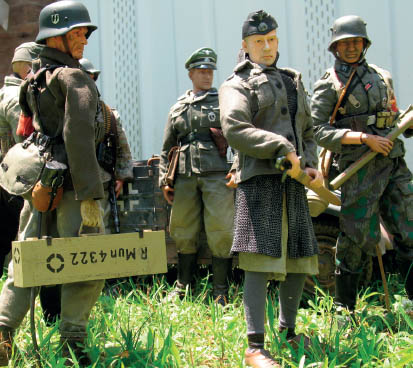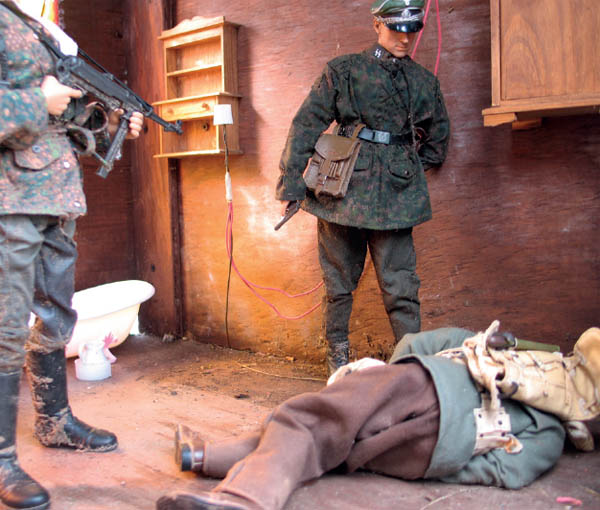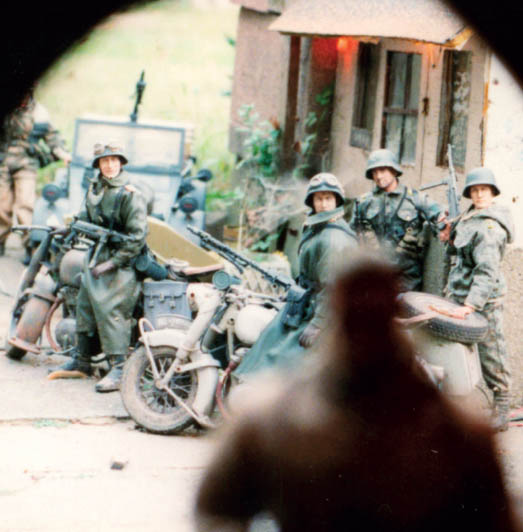A Nazi prepped for a public hanging.
While Mark was rebuilding his life, detectives were building a case against his five attackers. The prosecution was led by Emmanuel Nneji, the then assistant district attorney for Ulster County.
In his first life, Mark might have overlooked Nneji, a colossus of a man who emigrated from Nigeria in 1980. But in his second life, Mark appreciated Nneji’s kindness, his sharp sense of justice, and his dogged pursuit of the facts.
Nneji suspected that Mark’s attack may have been a hate crime. The bartender, and even some of the attackers, had overheard Mark telling Freddy Hommel that he was a cross-dresser, and all had noted Hommel’s discomfort. But Nneji couldn’t find enough evidence to support a hate-crime conviction, so he and detectives followed a different route.
Records show that four months before the attack, Richard Purcell, David Mead, Noah Rand, and Black Freddy signed an oath to the local branch of a national prison gang. The affiliation was enough to get the attackers charged with gang assault.
In May of 2000, the five attackers were indicted by an Ulster County grand jury for gang assault in the first and second degree, and reckless endangerment in the first degree. The heat of a fight may turn men into brothers, but when prison is on the line, those bonds can evaporate in an instant. It was every man for himself.
Rand claimed he hadn’t touched Mark, but he had failed to report the attack and he had driven one of the cars that sped away from the scene. Rather than face a jury, he decided to plead guilty to lesser charges: assault in the third degree and reckless endangerment in the first degree. He received a sentence of five years’ probation.
Like Rand, Mead claimed he hadn’t hurt Mark. But detectives reported that Mead had initially told them a phony story and had hidden and replaced his shoes from the night of the attack. Nevertheless, Mead’s family fought the charges with a vengeance.
His lawyer submitted one character letter after another, each describing Mead as a good kid who’d been in the wrong place at the wrong time. He ultimately proceeded to trial and was acquitted of everything except assault in the third degree and reckless endangerment in the first degree. He received the same sentence as Rand: five years’ probation.
Black Freddy was a more challenging case. He’d lied to the police at first but ultimately admitted to kicking Mark as much as any of his fellow attackers. He had a troubling history of violence and substance abuse, but he was from a broken home and had suffered from depression. He had also been a minor at the time of the attack and claimed that he had only joined in so he wouldn’t be an outcast.



The SS in Marwencol were inspired by Mark’s five attackers. They are immortal killing machines, perpetually terrorizing Marwencol in their hunt for Mark’s alter ego, Hogie.
Black Freddy ultimately pled guilty to all charges and cooperated with authorities, even testifying at the trials of his fellow attackers. In return, he received the minimum sentence of five years in prison.
Hommel, the undisputed instigator of the attack, quickly agreed to a plea deal. He testified that he had initiated the fight but hadn’t hurt Mark—the damage, he claimed, had been done by Purcell.
“Richie was jumping on his head with both feet together...jumping on the guy’s head and his chest,” he said in court. In the end, Hommel received a reduced five-year prison sentence.
So it all came down to Purcell. He hadn’t started the fight, but witnesses raised disturbing details during his trial. Purcell was allegedly the one who had convinced Mead, Rand, and Black Freddy to join the gang and had fought someone on Hommel’s behalf before. After he stomped on Mark’s head with his heavy boots, the other attackers remembered having to “pull [Purcell] away from the victim to get him to stop.” He had shown off the blood on his boots to his friend Steve. And the others claimed he had tried to convince Black Freddy to take the blame for the attack since Black Freddy was a minor and would ostensibly get into the least amount of trouble.
After one mistrial, Purcell pled guilty and received a sentence of nine years in prison. While his sentence was sixteen years below the twenty-five-year maximum, Purcell’s attorney tried to appeal its severity. The appeal was denied.
Years later, Mark’s attackers became the inspiration for the band of five deadly SS soldiers who terrorize Marwencol. Mark eventually shared some of his Marwencol stories and photos with Nneji, who said Mark’s art touched him very significantly. “If somebody is in pain, you can see it in his art. It’s nice that, if somebody hurts you, you can—without any violence—get back at them.”
The attackers were also featured in the documentary Marwencol by director Jeff Malmberg; however, the director chose not to reveal the fates of the five attackers. “Every time I tried to include the information about the trials, it gave Mark’s story a false sense of closure, as if justice had been served. It certainly never felt that way to Mark—he never felt any sense of resolution—so I didn’t feel it was fair to give that to the audience.”
By 2010 all five of Mark’s attackers were free and living dual lives as regular citizens in the real world and SS soldiers in Marwencol.